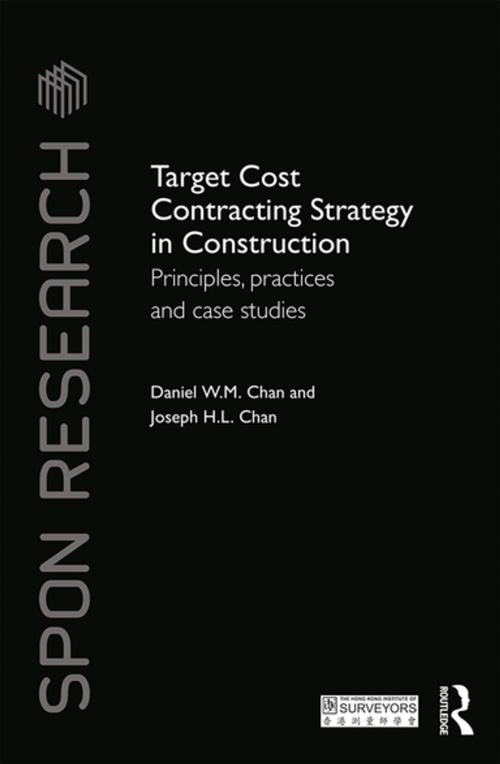Target Cost Contracting Strategy in Construction
Principles, Practices and Case Studies
Nonfiction, Science & Nature, Technology, Construction & Construction Trades, Business & Finance| Author: | Daniel W.M. Chan, Joseph H.L. Chan | ISBN: | 9781317229261 |
| Publisher: | CRC Press | Publication: | October 14, 2016 |
| Imprint: | Routledge | Language: | English |
| Author: | Daniel W.M. Chan, Joseph H.L. Chan |
| ISBN: | 9781317229261 |
| Publisher: | CRC Press |
| Publication: | October 14, 2016 |
| Imprint: | Routledge |
| Language: | English |
The problems inherent in the traditional design-bid-build procurement method often lead to the adversarial working relationships within the construction industry. Target cost contracts, accompanied by a gain-share/pain-share arrangement serving as a cost incentive mechanism, have emerged in the United States, the United Kingdom, Australia and Hong Kong with the aim of achieving better value for money and more satisfactory overall project performance under a collaborative working relationship.
This book presents the underlying principles, practicalities and a series of short case studies of applying the target cost contracting strategy. Principles begin with the fundamentals then cover the development of target cost contracting in major countries/cities, definitions of target cost contracting, perceived benefits, potential difficulties and critical success factors for implementation.
Practices include the target cost contracting approach and process in general, the key risk factors, risk assessment model, risk allocation and risk mitigation measures for target cost contracts in particular, together with a conceptual framework for the performance measurement of target cost contracts. Several short real-life case studies from the United Kingdom, Hong Kong, Australia and New Zealand are provided for further illustration.
The book will appeal to a wide spectrum of readers from industrial practitioners to undergraduate students, researchers and academics interested in construction contracts and procurement methods.
The problems inherent in the traditional design-bid-build procurement method often lead to the adversarial working relationships within the construction industry. Target cost contracts, accompanied by a gain-share/pain-share arrangement serving as a cost incentive mechanism, have emerged in the United States, the United Kingdom, Australia and Hong Kong with the aim of achieving better value for money and more satisfactory overall project performance under a collaborative working relationship.
This book presents the underlying principles, practicalities and a series of short case studies of applying the target cost contracting strategy. Principles begin with the fundamentals then cover the development of target cost contracting in major countries/cities, definitions of target cost contracting, perceived benefits, potential difficulties and critical success factors for implementation.
Practices include the target cost contracting approach and process in general, the key risk factors, risk assessment model, risk allocation and risk mitigation measures for target cost contracts in particular, together with a conceptual framework for the performance measurement of target cost contracts. Several short real-life case studies from the United Kingdom, Hong Kong, Australia and New Zealand are provided for further illustration.
The book will appeal to a wide spectrum of readers from industrial practitioners to undergraduate students, researchers and academics interested in construction contracts and procurement methods.















